- Home
- Clive Barker
Coldheart Canyon: A Hollywood Ghost Story
Coldheart Canyon: A Hollywood Ghost Story Read online
This is a work of fiction. Names, characters, places and incidents either are the products of the author's imagination or are used fictitiously. Any resemblance to actual events, locales, organizations, or persons, living or dead, is entirely coincidental and beyond the intent of either the author or the publisher.
COLDHEART CANYON. COPYRIGHT © 2001 BY CLIVE BARKER. ALL RIGHTS RESERVED UNDER INTERNATIONAL AND PAN-AMERICAN COPYRIGHT CONVENTIONS. BY PAYMENT OF THE REQUIRED FEES, YOU HAVE BEEN GRANTED THE NON-EXCLUSIVE, NON-TRANSFERABLE RIGHT TO ACCESS AND READ THE TEXT OF THIS E-BOOK ON-SCREEN. NO PART OF THIS TEXT MAY BE REPRODUCED, TRANSMITTED, DOWN-LOADED, DECOMPILED, REVERSE ENGINEERED, OR STORED IN OR INTRODUCED INTO ANY INFORMATION STORAGE AND RETRIEVAL SYSTEM, IN ANY FORM OR BY ANY MEANS, WHETHER ELECTRONIC OR MECHANICAL, NOW KNOWN OR HEREINAFTER INVENTED, WITHOUT THE EXPRESS WRITTEN PERMISSION OF PERFECTBOUND™.
Coldheart Canyon: The Revelations Interview: Clive Barker comments copyright © 2001 by Clive Barker. Reprinted by permission. Revelations comments copyright © 2001 by Phil and Sarah Stokes. Reprinted by permission.
PerfectBound ™ and the PerfectBound™ logo are trademarks of HarperCollins Publishers. Adobe Acrobat E-Book Reader edition v 1. September 2001 ISBN 0-06-001035-5 First published in Great Britain in 2001 by HarperCollins Publishers. A signed limited edition was published by B. E. Trice Publishing, New Orleans.
10 9 8 7 6 5 4 3 2 1
For David Emilian Armstrong
ACKNOWLEDGMENTS
There are a lot of people to thank for helping me bring this one home. It was a devil of a book to write, for a host of reasons. For one thing, I began writing it the week before my father passed away, and inevitably the long shadow of that event dimmed the joy of writing, at least for the first six months or so, slowing it to a crawl.
Paradoxically, even as my production of usable text diminished, I could feel the scale of the story I wanted to tell getting bigger. What had originally begun life as an idea for a short, satiric stab at Hollywood began to blossom into something larger, lusher, and stranger: a fantasia on Hollywood both in its not-so-innocent youth and in its present, wholly commercialized phase, linked by a sizable cast and a mythology which I would need to create and explain in very considerable detail.
I don't doubt that this second incarnation of the book will be much more satisfying a read than the first—which I had written almost in its entirety before changing direction—but Lord, it was a sonofabitch to get down onto the page.
Forgive me, then, if the list of people I'm thanking is longer than usual. And believe me when I tell you every one of them deserves this nod of recognition, because each has helped get Coldheart Canyon out of my head and into print.
Let me begin with the dedicatee of this book, David Emilian Armstrong, my husband and in every sense of the word my partner: the one who was with me when one of our five dogs, Charlie, passed away (Charlie's loving presence, and the sadness and frustration of losing him, is recorded in this novel). David always has faith in my capacity to go one step further: to make the tale I'm telling a little richer, the picture I'm painting a little brighter, the photograph I'm taking a little sexier.
My thanks to Craig Green and Don MacKay, to whom I first gave the handwritten pages to be typed; and most especially to David John Dodds—my oldest and dearest friend—who worked through much of the Christmas period (with the Seraphim offices deserted around us) polishing the text, then polishing the polishes, so that the immense manuscript would be ready to be dispatched to my publishers before I went to recuperate in Kauai.
To Bob Pescovitz, my researcher, and Angela Calin, my translator, my thanks.
To Michael Hadley, Joe Daley and Renee Rosen, who run all the various aspects of my creative life outside writing and painting (films, television, theme park mazes and toy-lines, web-sites, photographs—and the endless business of promoting the above), my gratitude. In the last year and a half, I have often been an absentee boss, because I've been in the wilds of Coldheart Canyon. During that period, they have worked together to make our businesses prosper. Let me not forget Ana Osgood and Denny McLain, to whom fall the very considerable responsibilities of organizing and archiving my visual work, especially the many enormous paintings for my next books, The Abarat Quartet.
Then there are the two people—Toya Castillo and Alex Rosas—who make the homes in which we work run smoothly. Who feed David and myself, and wash our clothes; who make sure there's shampoo in our shower and our dogs smell sweet. Again, I have been something of a phantom of myself for much of the last year, passing through the house on my way to write or paint with a distracted look. They kindly indulge my craziness, and my endless calls for cups of hot sweet tea.
I also owe a great debt of gratitude to Doctor Alex del Rosario, and his assistant, Judy Azar. I recently described Alex as the perfect "artist's doctor." He has guided me through some lengthy periods of sickness in the last couple of years, understanding as no other physician in my history has the fierce and sometimes self-wounding passion that makes artists attempt to do the impossible: to paint another world into being, while writing a two-hundred-thousand-word novel while producing a couple of movies, for instance. For me, this is my natural, albeit obsessive, behavior. But my body isn't that of a thirty-year-old any longer (or even that of a forty-year-old!). It complains now when I drive it hard; as I do daily. It has taken a massive contribution of sympathetic counsel, medication and alternative therapies to keep body and spirit together since my father's death and I owe Alex a huge debt of thanks for my present good health.
Finally, the powers that be. First, my love and thanks to Ben Smith, my Hollywood agent, who has been a true visionary in a job that is often maligned (in this book, for instance) as being for cold, artistically disinterested men and women. My thanks and great admiration go to the lawyer who has helped shape my business life in the last two years, David Colden. The Abarat deal with the Disney Company was the largest literary deal made in Hollywood last year, and it covers every possible shape and permutation that my invented world might take, in the hands of Disney's imagineers. To give you a taste of what kind of wordage David Colden has minutely analyzed on my behalf: the Disney contract had three pages alone devoted to listing its contents!
On the literary side, my dear Anne Sibbald, who has surely the tender-est heart of any agent who ever represented an unreformed maker of monsters like myself, has been a constant source of encouragement, and a fearless champion when—on occasion—the machinations of the corporate world proved painful and incomprehensible.
And last—but oh, you both know, never least—my editors.
In New York, Robert Jones (who's had his own wars to fight of late, and has still always been there with a witty word of support; or some wonderfully dry remark at the expense of the many idiocies of the publishing world).
And finally we come to Jane Johnson. My Jane, I insist, the Editor of Editors, who is never far from my mind when I set pen to paper.
Increasingly, Jane, I think I write to entertain you, to please you. We have survived for many years together on a raft of shared beliefs about the necessity of dreams, tossed around in the tumultuous seas of modern publishing. In that time, Jane has lost countless colleagues to exhaustion, frustration and despair, and yet she manages to be a mistress of beautiful prose as well as an editor of a stable of authors, who, like me, could not imagine their literary lives continuing without her.
I would have given up the increasingly problematic ambition of having a broad audience for my work, and fled into the minor, the hermetic and the oblique, without her tireless encouragement.
My love to you, my Jane; and, as always, my h
eartfelt thanks.
Here's another tale for you, saved from the flood.
CB
CONTENTS
PROLOGUE The Canyon
PART ONE The Price of the Hunt
PART TWO The Heart-throb
PART THREE A Darker Time
PART FOUR Life After Fame
PART FIVE Desire
PART SIX The Devil's Country
PART SEVEN The A-List
PART EIGHT The Wind at the Door
PART NINE The Queen of Hell
PART TEN And the Dead Came In
PART ELEVEN The Last Chase
EPILOGUE And So, Love
ACKNOWLEDGEMENTS
PERFECTBOUND E-BOOK EXTRA:
COLDHEART CANNYON: the Revelations interview
ABOUT THE AUTHOR
CREDITS
ABOUT THE PUBLISHER
FRONT COVER
PROLOGUE
The Canyon
It is night in Coldheart Canyon, and the wind comes off the desert.
The Santa Anas, they call these winds. They blow off the Mojave, bringing malaise, and the threat of fire. Some say they are named after Saint Anne, the mother of Mary, others that they are named after one General Santa Ana, of the Mexican cavalry, a great creator of dusts; others still that the name is derived from santanta, which means Devil Wind.
Whatever the truth of the matter, this much is certain: the Santa Anas are always baking hot, and often so heavily laden with perfume that it's as though they've picked up the scent of every blossom they've shaken on their way here. Every wild lilac and wild rose, every white sage and rank jimson-weed, every heliotrope and creosote bush: gathered them all up in their hot embrace and borne them into the hidden channel of Coldheart Canyon.
There's no lack of blossoms here, of course. Indeed, the Canyon is almost uncannily verdant. Some of the plants here were brought in from the world outside by these same burning winds, these Santa Anas; others were dropped in the feces of the wild animals who wander through—the deer and coyote and raccoon; some spread from the gardens of the great dream palace that lays solitary claim to this corner of Hollywood. Alien blooms, this last kind—orchids and lotus flowers—nurtured by gardeners who have long since left off their pruning and their watering, and departed, allowing the bowers which they once treasured to run riot.
But for some reason there is always a certain bitterness in the blooms here. Even the hungry deer, driven from their traditional trails these days by the presence of sightseers who have come to see Tinseltown, do not linger in the Canyon for very long. Though the deer venture along the ridge and down the steep slopes of the Canyon, and curiosity, especially among the younger animals, often leads them over the rotted fences and toppled walls into the secret enclaves of the gardens, they seldom choose to stay there for very long.
Perhaps it isn't just that the leaves and petals are bitter. Perhaps there are too many whisperings in the air around the ruined gazebos, and the animals are unnerved by what they hear. Perhaps there are too many presences brushing against their trembling flanks as they explore the clotted pathways. Perhaps, as they graze the overgrown lawns, they look up and mistake a statue for a pale fragment of life, and are startled by their error, and take flight.
Perhaps, sometimes, they are not mistaken.
Perhaps.
The Canyon is familiar with perhaps; with what may or may not be. And never more so than on such a night as this, when the winds come sighing off the desert, heavy with their perfume, and such souls as the Canyon hosts express their longing for something they dreamed they had, or dreamed that they dreamed, their voices so tenuous tonight that they're inaudible to the human ear, even if there were someone to hear them, which there never is.
That's not entirely true. On occasion somebody will be tenacious enough to find his way into this vale of luxury and tears; a tourist, perhaps even a family of tourists, foolishly determined to discover what lies off the prescribed route; looking for some famous heart-throb's love-nest, or a glimpse of the idol himself, caught unawares as he walks with his dog. There are even a few trespassers over the years who have found their way here intentionally, guided to this place by hints dropped in obscure accounts of Old Hollywood. They venture cautiously, these few. Indeed there is often something close to reverence in the way they enter Coldheart Canyon. But however these visitors arrive, they always leave the same way: hurriedly, with many a nervous backward glance. Even the crassest of them—even the ones who'd claim they don't have a psychic bone in their bodies—are discomfited by something they sniff here. Their sixth sense, they have discovered, is far more acute than they had thought. Only when they have outrun the all-too-eager shadows of the Canyon and they are back in the glare of the billboards on Sunset Boulevard, do they wipe their clammy palms, and wonder to themselves how it was that in such a harmless spot they could have been so very afraid.
PART ONE
The Price
of the Hunt
ONE
"Your wife did not want to look around the Fortress any further, Mister Zeffer?" Father Sandru said, seeing that on the second day the middle-aged man with the handsome, sad face had come alone.
"The lady is not my wife," Zeffer explained.
'Ah . . ." the monk replied, the tone of commiseration in his voice indicating that he was far from indifferent to Katya's charms. 'A pity for you, yes?"
"Yes," Zeffer admitted, with some discomfort.
"She's a very beautiful woman."
The monk studied Zeffer's face as he spoke, but having said what he'd said, Zeffer was unwilling to play the confessee any further.
"I'm her manager," he explained. "That's all there is between us."
Father Sandru, however, was not willing to let the issue go just yet. "After the two of you departed yesterday," he said, his English colored by his native Romanian, "one of the brothers remarked that she was the most lovely woman he had ever seen ..." he hesitated before committing to the rest of the sentence ". . . in the flesh."
"Her name's Katya, by the way," Zeffer said.
"Yes, yes, I know," said the Father, his fingers combing the knotted gray-white of his beard as he stood assessing Zeffer.
The two men were a study in contrasts. Sandru ruddy-faced and rotund in his dusty brown habit, Zeffer slimly elegant in his pale linen suit.
"She is a movie star, yes?"
"You saw one of her films?"
Sandru grimaced, displaying a poorly-kept array of teeth. "No, no," he said. "I do not see these things. At least not often. But there is a little cinema in Ravbac, and some of the younger brothers go down there quite regularly. They are great fans of Chaplin, of course. And there's a . . . vamp ... is that the word?"
"Yes," Zeffer replied, somewhat amused by this conversation. "Vamp's the word."
"Called Theda Bara."
"Oh, yes. We know Theda."
In that year—which was 1920—everybody knew Theda Bara. She had one of the most famous faces in the world. As, of course, did Katya. Both were famous; their fame tinged with a delicious hint of decadence.
"I must go with one of the brothers when they next go to see her," Father Sandru said.
"I wonder if you entirely understand what kind of woman Theda Bara portrays?" Zeffer replied.
Sandru raised a thicketed eyebrow. "I am not born yesterday, Mister Zeffer. The Bible has its share of these women, these vamps. They're whores, yes; women of Babylon? Men are drawn to them only to be destroyed by them?"
Zeffer laughed at the directness of Sandru's description. "I suppose that's about right," he said.
"And in real life?" Sandru said.
"In real life Theda Bara's name is Theodesia Goodman. She was born in Ohio."
"But is she a destroyer of men?"
"In real life? No, I doubt it. I'm sure she harms a few egos now and again, but that's about the worst of it."
Father Sandru looked mildly disappointed. "I shall tell the brothers what you told me,"
he said. "They'll be very interested. Well then... shall I take you inside?"
Willem Matthias Zeffer was a cultured man. He had lived in Paris, Rome, London and briefly in Cairo in his forty-three years; and had promised himself that he would leave Los Angeles—where there was neither art nor the ambition to make art—as soon as the public tired of lionizing Katya, and she tired of rejecting his offer of marriage. They would wed, and come back to Europe; find a house with some real history on its bones, instead of the fake Spanish mansion her fortune had allowed her to have built in one of the Hollywood canyons.
Until then, he would have to find aesthetic comfort in the objets d'art he purchased on their trips abroad: the furniture, the tapestries, the statuary. They would suffice, until they could find a chateau in the Loire, or perhaps a Georgian house in London; somewhere the cheap theatrics of Hollywood wouldn't curdle his blood.
"You like Romania?" the Father asked as he unlocked the great oak door that lay at the bottom of the stairs.
"Yes, of course," Zeffer replied.
"Please do not feel you have to sin on my account," Sandru said, with a sideways glance.
"Sin?"
"Lying is a sin, Mister Zeffer. Perhaps it's just a little one, but it's a sin nevertheless."
Oh Lord, Zeffer thought; how far I've slipped from the simple proprieties! Back in Los Angeles he sinned as a matter of course; every day, every hour. The life he and Katya lived was built on a thousand stupid little lies.
But he wasn't in Hollywood now. So why lie? "You're right. I don't like this country very much at all. I'm here because Katya wanted to come. Her mother and father—I'm sorry, her stepfather—live in the village."
"Yes. This I know. The mother is not a good woman."
"You're her priest?"
"No. We brothers do not minister to the people. The Order of Saint Teodor exists only to keep its eyes on the Fortress." He pushed the door open. A dank smell exuded from the darkness ahead of them.

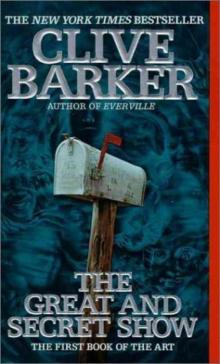 The Great and Secret Show
The Great and Secret Show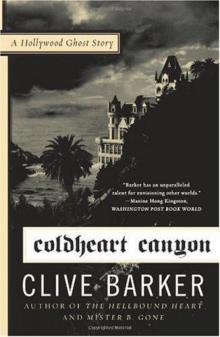 Coldheart Canyon: A Hollywood Ghost Story
Coldheart Canyon: A Hollywood Ghost Story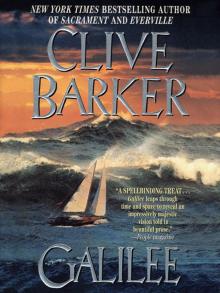 Galilee
Galilee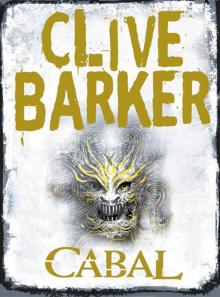 Cabal
Cabal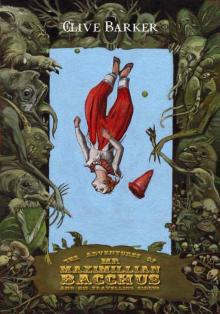 The Adventures of Mr. Maximillian Bacchus and His Travelling Circus
The Adventures of Mr. Maximillian Bacchus and His Travelling Circus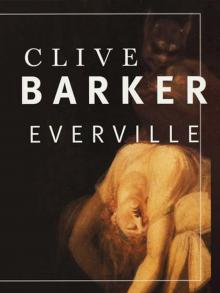 Everville
Everville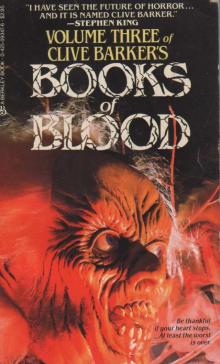 Books of Blood: Volume Three
Books of Blood: Volume Three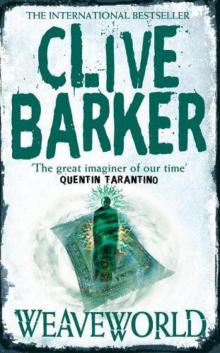 Weaveworld
Weaveworld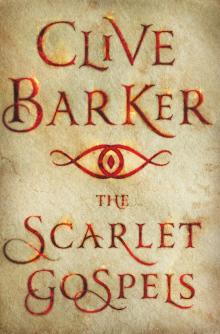 The Scarlet Gospels
The Scarlet Gospels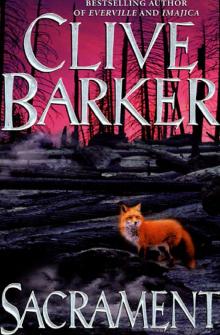 Sacrament
Sacrament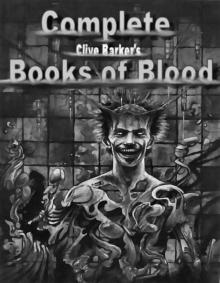 Books of Blood: Volumes 1-6
Books of Blood: Volumes 1-6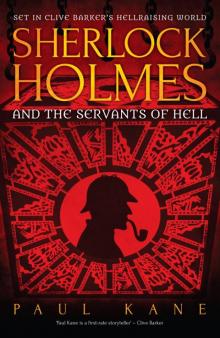 Sherlock Holmes and the Servants of Hell
Sherlock Holmes and the Servants of Hell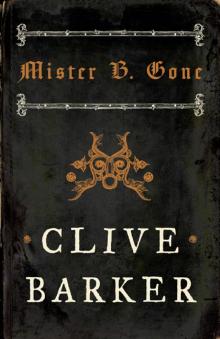 Mister B. Gone
Mister B. Gone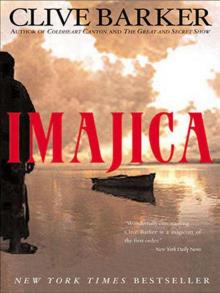 Imajica
Imajica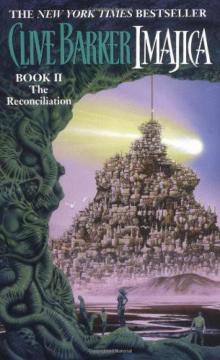 The Reconciliation
The Reconciliation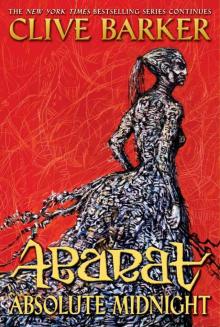 Abarat
Abarat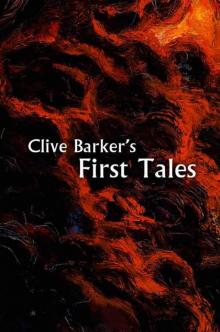 Clive Barker's First Tales
Clive Barker's First Tales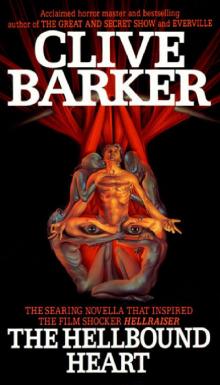 The Hellbound Heart
The Hellbound Heart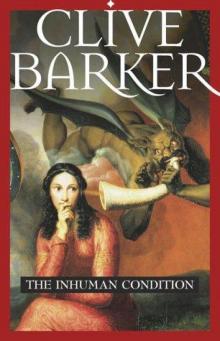 The Inhuman Condition
The Inhuman Condition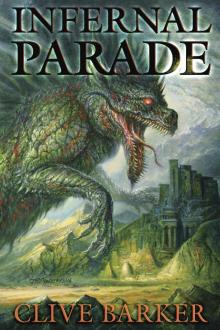 Infernal Parade
Infernal Parade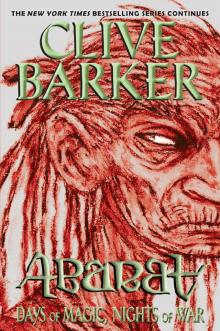 Days of Magic, Nights of War
Days of Magic, Nights of War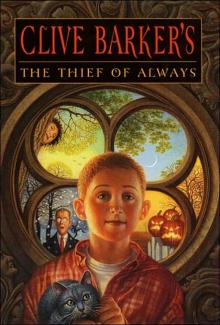 The Thief of Always
The Thief of Always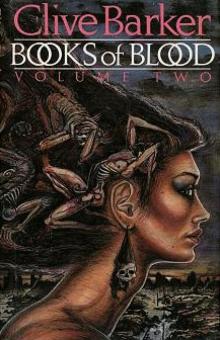 Books of Blood Vol 2
Books of Blood Vol 2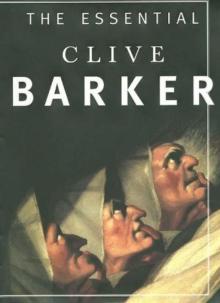 The Essential Clive Barker
The Essential Clive Barker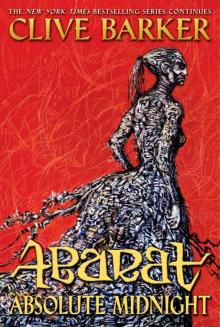 Abarat: Absolute Midnight a-3
Abarat: Absolute Midnight a-3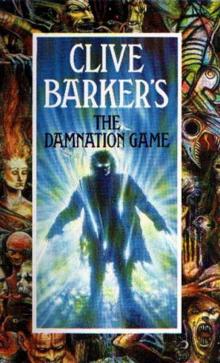 The Damnation Game
The Damnation Game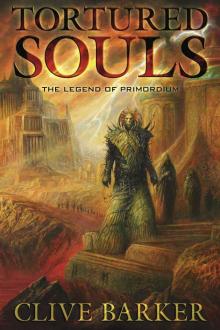 Tortured Souls: The Legend of Primordium
Tortured Souls: The Legend of Primordium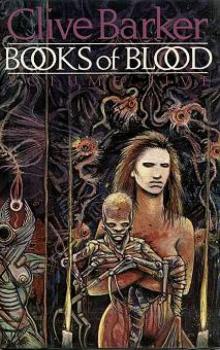 Books of Blood Vol 5
Books of Blood Vol 5 Imajica 02 - The Reconciliator
Imajica 02 - The Reconciliator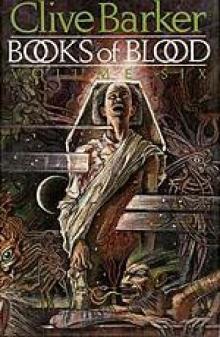 Books Of Blood Vol 6
Books Of Blood Vol 6 Imajica 01 - The Fifth Dominion
Imajica 01 - The Fifth Dominion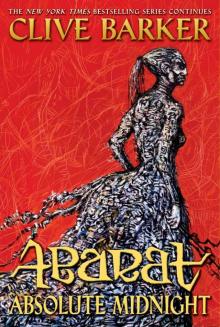 Abarat: Absolute Midnight
Abarat: Absolute Midnight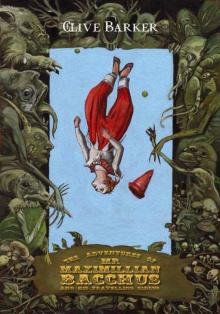 The Adventures of Mr. Maximillian Bacchus & His Traveling Circus
The Adventures of Mr. Maximillian Bacchus & His Traveling Circus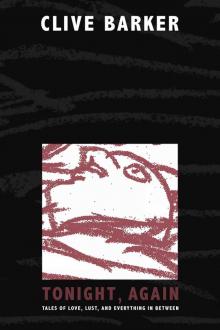 Tonight, Again
Tonight, Again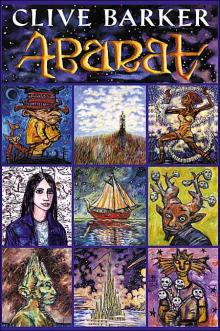 Abarat: The First Book of Hours a-1
Abarat: The First Book of Hours a-1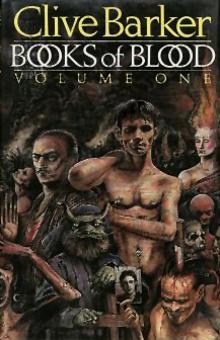 Books Of Blood Vol 1
Books Of Blood Vol 1 Age of Desire
Age of Desire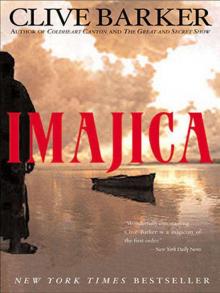 Imajica: Annotated Edition
Imajica: Annotated Edition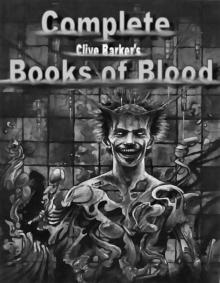 Complete Books of Blood
Complete Books of Blood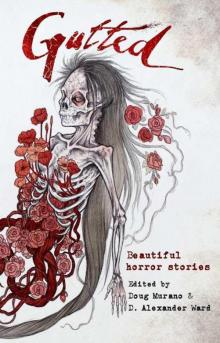 Gutted: Beautiful Horror Stories
Gutted: Beautiful Horror Stories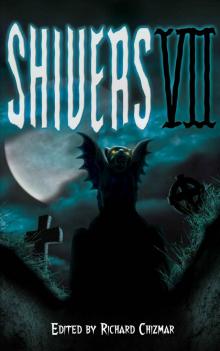 Shivers 7
Shivers 7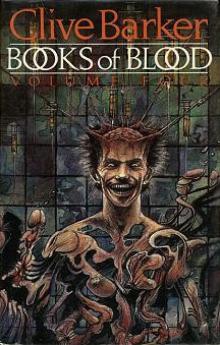 Books Of Blood Vol 4
Books Of Blood Vol 4